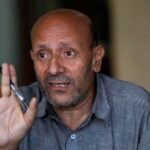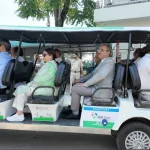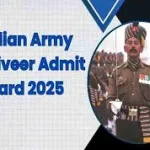The unexpected wins and losses during the 2024 Lok Sabha election, including the BJP losing key seats like Faizabad (Ayodhya, home to Lord Ram), remind one of the noted economist and former US Ambassador to India, John Kenneth Galbraith. He coined the term “Build Up,” which he defined as the “egregious expectation of a public figure—giving a public figure a character which, in fact, he does not have.”
Though Galbraith used the term in the context of large corporations, it applies equally well to public figures. Politicians who win a mandate with a thumping majority often tend to think they are invincible. Initially, the electorate also starts believing their leader is beyond reproach and capable of overcoming any challenge. Over time, such leaders invariably become overly confident and arrogant, disregarding public opinion and criticism. This ultimately results in disconnect from the electorate and a loss of public trust.
This explains the low victory margin for the ruling BJP, which until the other day was seen to be comfortably reaching 300 figure with Narendra Modi as the unchallenged leader.
Nobody has explained this phenomenon better than two right-wing thinkers: Swapan Dasgupta, Rajya Sabha member belonging to BJP, and the noted economist Surjit Singh Bhalla. Writing in the Times of India, Swapan Dasgupta argues, “the impression of highhandedness and arrogance doesn’t appear to have served BJP well in this election, and Modi will have to think of a corrective soft approach.”
Surjit Singh is even more explicit in his criticism of BJP’s electoral strategy. Writing in The Mint, he argues that it was the mistaken belief of the leadership that polarization works. Underlying all this seemed an arrogance bordering on “we can do no wrong.”
True, democratically elected popular leaders can lose elections for a variety of reasons, but arrogance is certainly one of them.
The saying “power corrupts, and absolute power corrupts absolutely” was articulated by Lord Acton, a British historian and moralist, in the late 19th century. It suggests that as a person’s power increases; their moral sense diminishes, leading them to abuse their power.
Such leaders invariably use passionate and emotional rhetoric to connect with the public. They often focus on issues that provoke strong feelings, such as fear, anger, or nationalism. They seek to gain and hold power by appealing to the emotions, prejudices, and fears of the public, often through inflammatory speeches.
History provides us with countless examples of power corrupting popular leaders into believing they are indispensable and irreplaceable. Despite his leadership during World War II, Winston Churchill was perceived as arrogant and out of touch with post-war social issues by the electorate, leading to his defeat by Clement Attlee in the 1945 general election.
Similarly, Charles De Gaulle, President of France from 1959 to 1969, was known for his authoritative style. His perceived arrogance and centralization of power led to his resignation after losing a referendum on regional reforms in 1969.
In India, Indira Gandhi, Prime Minister from 1966 to 1977 and again from 1980 until her assassination in 1984, faced significant opposition due to her autocratic rule and imposition of the Emergency from 1975 to 1977. She lost the 1977 election to the Janata Party.
In the 21st century, we have the example of Nicholas Sarkozy, who served as President of France from 2007 to 2012. His confrontational style and perceived arrogance contributed to his loss to François Hollande in the 2012 presidential election. This is only an illustrative list.
The transition of democratically elected leaders to arrogance within a democratic framework can be explained by a combination of psychological factors. Let me illustrate a few of them:
HUBRIS SYNDROME
Leaders with significant power may develop an inflated sense of their own importance, competence, and invulnerability. This is often referred to as hubris syndrome, where leaders start believing they are infallible. For example, Margaret Thatcher (United Kingdom) developed an increasing sense of infallibility and dismissal of opposing views, leading to her political isolation and eventual resignation.
CONFIRMATION BIASES
Leaders may surround themselves with like-minded individuals who reinforce their beliefs and decisions, ignoring dissenting opinions. This confirmation bias can lead to increasingly autocratic behavior. Remember, Zulfikar Ali Bhutto’s inner circle was filled with loyalists who reinforced his decisions, leading to increasingly autocratic and disastrous moves, resulting in the bloodless coup staged by his army chief Gen Zia Ul Haq.
RATIONALIZING DECISIONS
When faced with evidence that contradicts their beliefs or actions, leaders may experience cognitive dissonance and rationalize their behavior rather than reconsidering their approach. The arrest of Chandra Babu Naidu by Y S R Reddy and ED/CBI raids on opposition leaders were often rationalized by the top political leadership despite mounting evidence that contradicted their justifications.
HOMOGENEOUS THINKING
Leaders often create environments where dissent is discouraged, leading to groupthink. This results in poor decision-making and autocratic tendencies as alternative viewpoints are not considered. The best example of this is Indira Gandhi, who during the Emergency operated through a coterie headed by her son Sanjay, leading to a flawed and autocratic decision-making process, including the imposition of the Emergency in 1975.
AUTHORITY & OBEDIENCE
Studies, like the Milgram experiment, show that people tend to obey authority figures even when asked to perform actions that conflict with their personal morals. Leaders often exploit this tendency to consolidate power. Vladimir Putin has used nationalist and xenophobic rhetoric to gain support during the ongoing war with Ukraine. His inflammatory speeches often play on fears and prejudices, and he presents himself as a defender of Russian identity against foreign influence. His followers allow him to centralize power and dismantle democratic institutions.
POWER MAINTENANCE
Once in power, leaders often fear losing it and may resort to autocratic measures to maintain their position. This includes suppressing opposition, manipulating elections, and curtailing civil liberties. Sheikh Hasina of Bangladesh used her popularity to deny the opposition a free and fair chance in the recently held general elections.
WORSHIP
Leaders cultivate a cult of personality, where their image and persona are heavily promoted, often at the expense of the party’s collective image. Narendra Modi’s strong personal brand and popularity often overshadow the Bharatiya Janata Party. His policies and persona define the party’s direction. If such a leader has charisma, which Modi has in abundance, it attracts voters more than the party’s platform.
NARCISSISM
Leaders with narcissistic tendencies may develop an exaggerated sense of their own abilities and entitlement, leading to autocratic behavior as they seek to fulfill their grandiose self-image. Italy’s Silvio Berlusconi’s leadership style was often characterized by a focus on his personal image and interests, which led to accusations of autocratic behavior and corruption.
STRONG LEADERSHIP
In some cultures, there is a historical and societal expectation for strong, decisive leadership. Leaders may feel pressured to conform to these expectations, adopting more autocratic styles to meet public and political demands. Democratically elected Recep Tayyip Erdoğan of Turkey has increasingly adopted autocratic measures, convincing his people of the need for strong leadership to navigate national crises and security threats.
It is important to note that democratically elected popular leaders lose public confidence due to other equally important interplay of factors, including economic conditions, policy failures, scandals, unmet promises, changing public opinions, political miscalculations, strong opposition campaigns, external factors, voter fatigue, and demographic shifts. Each election is influenced by its unique context and the evolving priorities and sentiments of the electorate. These factors often intertwine, creating a complex environment that can erode a leader’s support base.
What is common to most powerful leaders is their tendency to insulate themselves from criticism, even if genuine. One only wishes that such leaders listen to the wise advice of Lyndon Johnson: “Keep your friends close; keep your critics even closer.”
Footnote
Does the victory at the hustings secured from the jail by Amritpal Singh from Khadoor Sahib, Punjab, and Engineer Rashid from Baramulla, Kashmir confirm the existence of ‘separatist sympathizers’—even if mute—at the grassroots? Or is it essentially a vote against the main state political parties that have governed the states for a long time? Regardless, the fact remains that all elected representatives are required to take an oath to uphold the Constitution, regardless of their personal or political beliefs.
(X Gurgaon-based, Ashok Ogra is a noted management & media professional cum educator. He can be reached on: [email protected])








